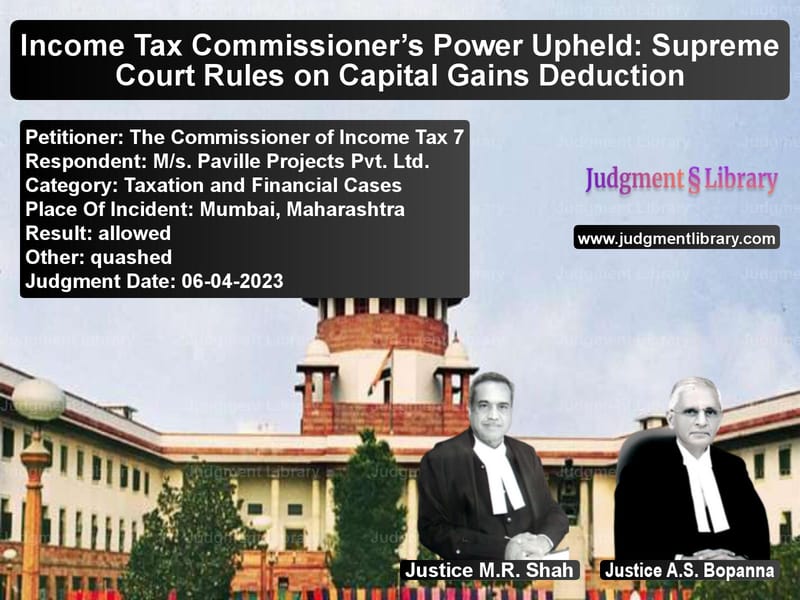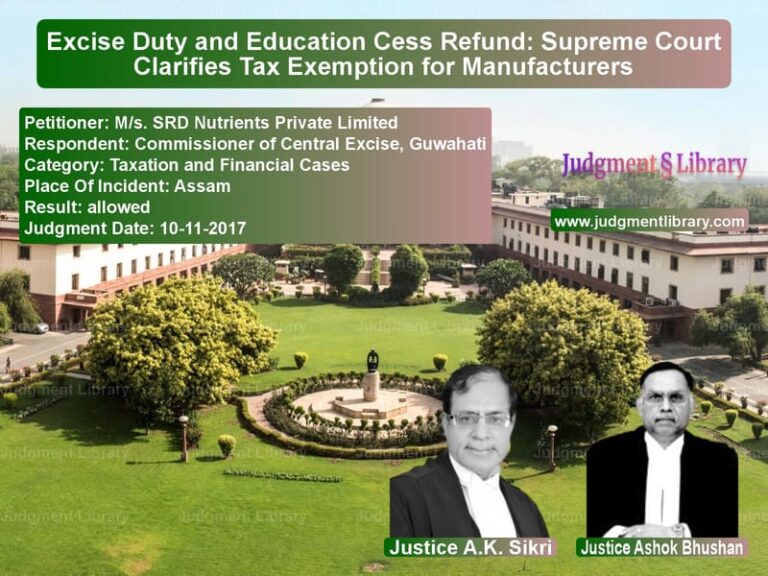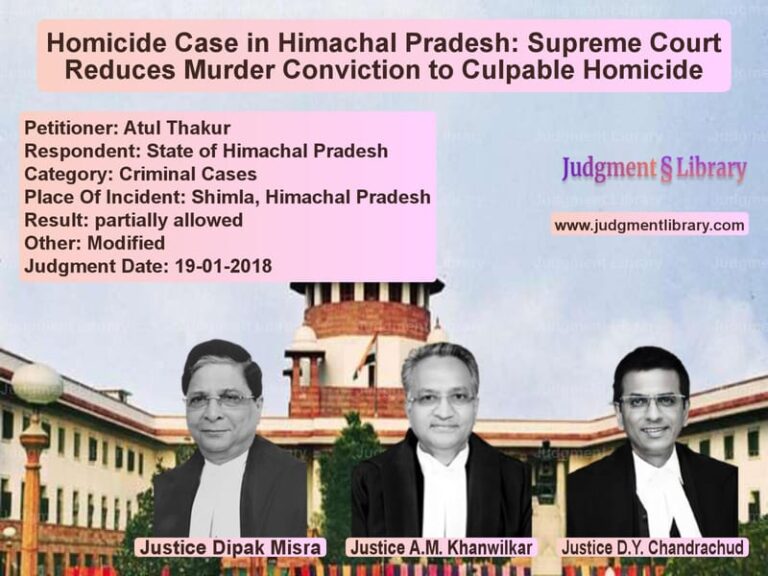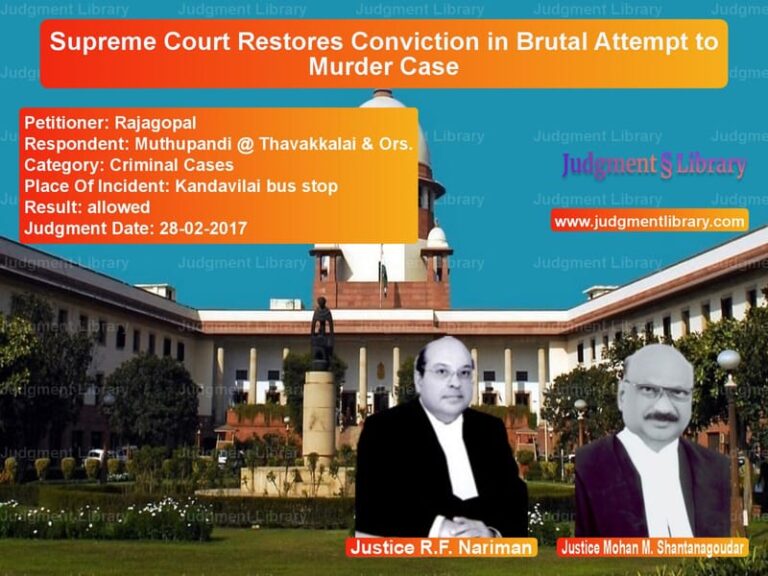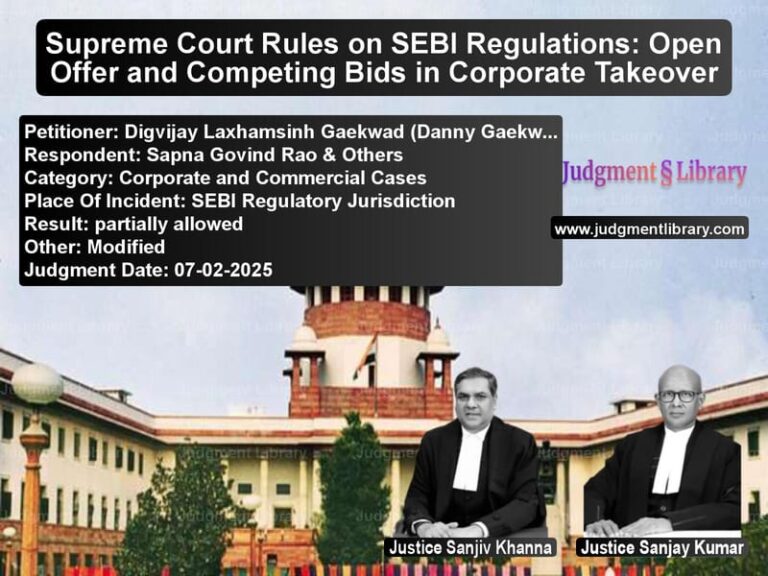Income Tax Commissioner’s Power Upheld: Supreme Court Rules on Capital Gains Deduction
The Supreme Court of India recently ruled in the case of The Commissioner of Income Tax 7 vs. M/s. Paville Projects Pvt. Ltd., clarifying the powers of the Commissioner of Income Tax (CIT) under Section 263 of the Income Tax Act, 1961. The case revolved around whether payments made to settle shareholder disputes could be considered a cost of improvement for capital gains tax purposes. The Court set aside the Bombay High Court’s ruling and restored the Commissioner’s order, reaffirming that erroneous assessments prejudicial to revenue can be revised.
Background of the Case
The respondent, M/s. Paville Projects Pvt. Ltd., was engaged in manufacturing and export of garments and shoes. For the assessment year (AY) 2007-08, the company reported the sale of a building, ‘Paville House,’ for Rs. 33 crore, claiming deductions for payments made under a shareholder settlement.
Key details include:
- The company owned Paville House, which was constructed on land purchased in 1972.
- Internal disputes among shareholders led to litigation before the Company Law Board and the High Court, culminating in arbitration.
- As per the arbitration settlement, three shareholders were paid Rs. 10.35 crore each, amounting to Rs. 31.05 crore in total.
- The company claimed this settlement amount as a cost of improvement, reducing its taxable capital gains.
The assessing officer (AO) initially accepted this deduction, but the Commissioner of Income Tax later invoked Section 263, arguing that the deduction was erroneous and prejudicial to revenue.
Legal Proceedings
Commissioner’s Decision
The Commissioner of Income Tax (CIT) held that:
- The payments made to shareholders were neither expenses nor related to improving the capital asset.
- The settlement did not qualify as a ‘cost of improvement’ under Section 55(1)(b) of the Income Tax Act.
- Removing encumbrances does not equate to capital improvement unless it enhances the property’s value.
- The AO’s decision was erroneous and resulted in revenue loss, justifying revision under Section 263.
ITAT and High Court’s Ruling
The Income Tax Appellate Tribunal (ITAT) overturned the CIT’s decision, citing:
- The Bombay High Court’s ruling in CIT vs. Smt. Shakuntala Kantilal, where similar deductions were allowed.
- The AO had taken a plausible view, making revision unwarranted under Section 263.
The High Court upheld ITAT’s ruling, emphasizing that loss of revenue alone does not justify invoking Section 263.
Supreme Court’s Observations
The Supreme Court bench, comprising Justices M.R. Shah and A.S. Bopanna, disagreed with the High Court and ruled in favor of the tax department. Key observations include:
- “For Section 263 to apply, an assessment order must be both erroneous and prejudicial to revenue. In this case, both conditions were met.”
- “A shareholder settlement is not a cost of improvement under Section 55(1)(b). The AO’s acceptance of such deduction was legally unsustainable.”
- “Revenue loss due to an erroneous assessment justifies the Commissioner’s intervention.”
- “The High Court misapplied judicial precedents. Not all AO decisions are immune from revision under Section 263.”
Final Judgment
The Supreme Court set aside the Bombay High Court’s ruling and restored the Commissioner’s order, holding that:
- The AO’s decision to allow Rs. 31.05 crore as a deduction was erroneous.
- The CIT was correct in invoking Section 263 to rectify the mistake.
- The revenue was entitled to reassess capital gains without the contested deduction.
Implications of the Judgment
The ruling has significant implications for tax assessments and corporate financial structuring:
- Stricter Oversight: The decision empowers tax authorities to correct erroneous assessments that favor taxpayers unjustifiably.
- Clarification on Capital Gains: Shareholder settlements do not qualify as costs of improvement for capital gains deductions.
- Limits on AO’s Discretion: The judgment reinforces that AO decisions, if legally flawed, can be corrected under Section 263.
Conclusion
The Supreme Court’s verdict in The Commissioner of Income Tax 7 vs. M/s. Paville Projects Pvt. Ltd. strengthens the tax department’s authority to correct flawed assessments. It ensures that capital gains tax is computed accurately, preventing undue deductions based on misinterpretations of the law. The ruling is a crucial precedent in tax law, safeguarding revenue while maintaining judicial oversight.
Petitioner Name: The Commissioner of Income Tax 7.Respondent Name: M/s. Paville Projects Pvt. Ltd..Judgment By: Justice M.R. Shah, Justice A.S. Bopanna.Place Of Incident: Mumbai, Maharashtra.Judgment Date: 06-04-2023.
Don’t miss out on the full details! Download the complete judgment in PDF format below and gain valuable insights instantly!
Download Judgment: the-commissioner-of-vs-ms.-paville-project-supreme-court-of-india-judgment-dated-06-04-2023.pdf
Directly Download Judgment: Directly download this Judgment
See all petitions in Income Tax Disputes
See all petitions in Tax Refund Disputes
See all petitions in Banking Regulations
See all petitions in Judgment by Mukeshkumar Rasikbhai Shah
See all petitions in Judgment by A. S. Bopanna
See all petitions in allowed
See all petitions in Quashed
See all petitions in supreme court of India judgments April 2023
See all petitions in 2023 judgments
See all posts in Taxation and Financial Cases Category
See all allowed petitions in Taxation and Financial Cases Category
See all Dismissed petitions in Taxation and Financial Cases Category
See all partially allowed petitions in Taxation and Financial Cases Category

